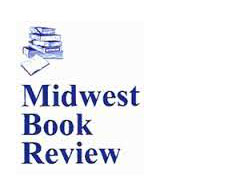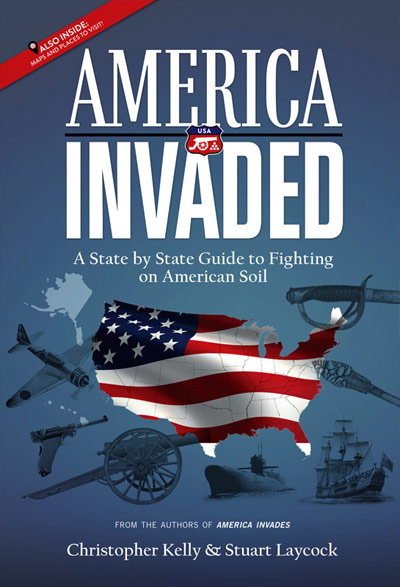
– MIDWEST BOOK REVIEW:
SMALL PRESS BOOKWATCH
Unique, informative, exceptionally well written, organized and presented, “America Invaded: A State by State Guide to Fighting on American Soil” is an inherently fascinating read and will prove to be an extraordinary and highly prized addition to the personal reading lists of American history buffs, as well as an unusual and enduringly popular addition to both community and academic library American History collections and supplemental studies reading lists.
– Professor Andrew Roberts, author Napoleon; A Life
Christopher Kelly and Stuart Laycock have once again pulled off a remarkable feat of fascinating scholarship. What an inspired idea to look at how warfare has touched each state of the Union individually, reminding us simultaneously of the proud American warrior tradition and of the sometimes brutal and bloody birth pangs of the USA.”

“A captivating look at how America’s 50 states survived on the way to becoming a nation…”
– KIRKUS REVIEWS
KIRKUS REVIEWS SAYS: A historical compendium proves that many countries had a shot at the land that became the United States, but circumstances instead resulted in a new nation.
For their latest volume, Kelly and Laycock (America Invades, 2015, etc.) turn their series concept on its head. Instead of detailing how a particular country invades other nations, it summarizes how various countries invaded the United States. And the work re-emphasizes how the U.S.’s many vanquishers pushed its only true inhabitants, the Native Americans, off their lands and onto fixed reservations. As Kelly writes in the introduction: “These invasions have, for good or ill, reshaped” America and “in many ways defined her.” The authors take the reader alphabetically through the 50 states and Washington, D.C., covering skirmishes, great and small, that took place within each. The exhaustive research shows how the governance—and the borders—of each state was exceptionally fluid, as conquerors came and went, often because of military action elsewhere, either in North America or around the globe. Drawing from hundreds of years and thousands of battles, the two succeed in being extremely thorough rather than all-encompassing. Yet they manage to keep their book an airy read. That’s because, as always, Kelly and Laycock are masters of the fascinating factoid, information that’s tangential to their overall thesis yet exceptionally worthwhile: “The training of African-American airmen at Tuskegee is also a noteworthy feature of Alabama’s war effort during World War II. In March of 1941, First Lady Eleanor Roosevelt was a passenger in a plane flown by an African-American pilot over Alabama.” Because both authors are history buffs, Kelly acknowledges that this volume was almost inevitable: “America Invaded was in many ways inspired by my personal journal of discovery of American military history. In 2014, I drove through 36 states on my book tour forAmerica Invades.” The work contains a treasure trove of maps, photos, and Web addresses that allows amateur historians to undertake their own research. All told, this is a worthwhile addition to the authors’ invasion series. The only question remaining is, after covering Britain, Italy, and America (twice), which nation will pique their curiosity next?
A captivating look at how America’s 50 states survived on the way to becoming a nation.
“America Invaded is a lively, meticulously researched, and provocative history of military incursions into the various states down through the years…”
– CIVIL WAR TIMES

ROBERT GUTTMAN OF CIVIL WAR TIMES SAYS: America Invaded is a follow-up to Christopher Kelly and Stuart Laycock’s earlier book, America Invades, which presented the history of U.S. invasions of other countries. America Invaded does the same for instances in which the United States was invaded by others. The authors have presented their history of these invasions on a state-by-state basis, with each state represented by an individual chapter. They have also included a list and map of relevant historical sites in each state.
Although the title of the book implies stories of America being invaded by “foreigners,” much of the book is concerned with instances of the invasion of “Native-American” territory by “Europeans,” frequently denoting explorers, settlers or military forces from the expanding United States. In addition, a good many of the “invasions” recounted involve incidents in which Americans invaded American soil during the Civil War. A notable example involves the peculiar case of West Virginia. After Virginia seceded from the Union in 1861, western Virginia in turn seceded from Virginia in order to remain in the Union. For the remainder of the war, West Virginia would be invaded by Rebel armies bent upon returning the breakaway state to Virginia, and by Union armies equally determined to prevent them from doing so.
America Invaded is a lively, meticulously researched, and provocative history of military incursions into the various states down through the years. It will undoubtedly find a place on the bookshelves of American history buffs everywhere.
“Easy to browse and easy to enjoy … it shines a light on small incidents that are shoveled aside in many books…”
America Invaded by Christopher Kelly and Stuart Laycock offers an intriguing tour of past conflicts waged on American soil, from the Atlantic to the Pacific.
Arranged alphabetically by state, the book is easy to browse and easy to enjoy. Each conflict is introduced with background information that puts events in context. While some parts of the country—especially those involved both in the Revolution and the Civil War—can lay claim to more battles than others, the text does a fair job of giving equal attention to each state, no matter its size or the bounty of its history.
The difficulty of delivering an account that is simultaneously correct, relevant, and comprehensive for all fifty states sometimes shows, as when major battles are covered in a few paragraphs and small ones are expanded for the sake of balance.
Compressing a lot of facts into a few paragraphs, as in the case of Southern states that saw many decisive Civil War battles, can give the text a rushed feel, but the authors occasionally pause to insert passages from original sources, such as Ulysses S. Grant’s memoirs or lines from Custer’s last message from the Battle of the Little Bighorn.
The advantage of the book’s broad reach is that it shines a light on small incidents that are shoveled aside in many books. Contrary to the supposition that American soil was never touched during the World War II, America Invaded chronicles a number of German U-boats that were sighted or sunk off the east coast as well as the Gulf coast. An even lesser-known assault came from the Japanese, who launched innumerable balloon bombs that were to land in North America and set fire to the forests of Canada and the Pacific Northwest. Years later, unexploded bombs were still being found as far east as the Mississippi River…
Maps…are excellent, with an appealing, easy-to-read graphic style and historical sites—such as forts and battles—clearly marked. A two-page bibliography of suggested reading is also included, and a good guide for those who want to broaden their knowledge of events covered in the book.
America Invaded is a fun jumping-off point for discussions about history.
“Even a devotee of American history is sure to learn something here”
SEATTLE BOOK REVIEW GIVES 4.5/5 STARS: When you think of warfare on American soil, you probably think of the Civil War and little else. But don’t be fooled. Every state in the union has seen violence and bloodshed, whether it’s between Europeans and Native Americans, during border disputes both north and south, or even delivered via balloon by Japanese forces. America may be a young country, but it’s been a fighting country the whole time.
America Invaded explores the history of combat and warfare on American soil, covering everything from violence during the crossing of the Siberian land bridge all the way to terrorist attacks in the last few years. It’s a remarkably in-depth and well-researched tome, covering all 50 states, the capital, and even ships bearing the names of various states.
Even a devotee of American history is sure to learn something here. (I, for one, had no idea the Japanese balloon bombs made it as far inland as Michigan, Iowa, and North Dakota. That’s MADNESS.)
And at a time when we feel more divided than ever, this book is a worthwhile reminder of the times we fought together and of how we can learn from the times we fought ourselves. What an engrossing work of historical study.
–Review by Glenn Dallas










